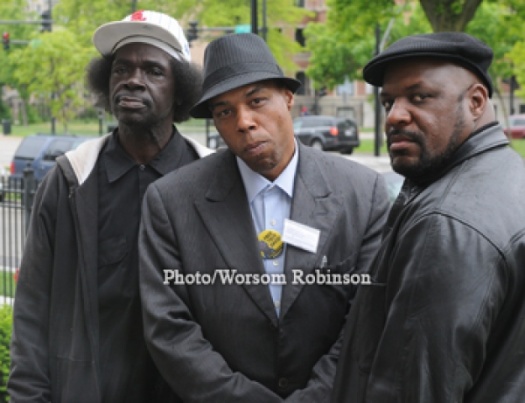
From left, Melvin Jones, Mark Clements, Marvin Reeves
The beatings began in the early and late 1970s and went on at least until 1991. But at least three victims, allegedly tortured by the hands of former Chicago police Commander Jon Burge and his men, remember it vividly as if it were yesterday.
Mark Clements, Melvin Jones and Marvin Reeves also remember the sounds of men being tortured in the next room while they were in custody decades ago.
Now, the click of handcuffs on Burge’s wrist would be “sweet music” to their ears, said Clements. A special prosecutor ruled in 2006 that Burge and several detectives under his leadership tortured more than 100 suspects into confessing to crimes through beatings, electric shock and other heinous methods between 1972 and 1991 while in custody at either Area 2 or Area 3.
Many alleged torture victims were convicted of crimes they allege they weren’t involved in. Some had their convictions overturned; some were sentenced to death.
After several lawsuits by victims and an investigation by the then-Office of Professional Standards, Burge was eventually fired in 1993 from the Chicago Police Department. The statute of limitations for the alleged torture had run out, however, the former commander was indicted in October 2008 on perjury and obstruction of justice charges for allegedly lying to special prosecutors during the 2006 investigation. He has pleaded not guilty and his trial is scheduled to begin May 24.
“I was arrested at my home and taken to Area 2. Lt. Burge was there at the time,” said Jones. “I was asked about homicides I knew nothing about. When I told them I didn’t know what they were talking about, Lt. Burge hit me with a gun. About five or six hours later, Burge came back into the room with a little cigar-type box. It was a homemade electric device,” Jones told the Defender.
That’s when the four-day torture began in 1982 for Jones, who was convicted of a homicide he never confessed to. He spent nearly seven years in prison before being retried and found not guilty. He was released in 1989 and is currently homeless.
In August 1988, Reeves and his family were awakened by a knock at the door. Detectives took him into custody for a quintuple homicide on the South Side over an alleged drug debt, said Reeves. Detectives told him he was fingered as the killer. He, again, said he had nothing to do with the murders.
About four hours later, a detective slid a piece of paper to him and told him to sign it and he could go home.
When he refused to sign the made-up confession, that’s when the beatings began for the next several hours. He maintained his innocence, and made up his mind that he’d let them kill him before he signed, he told the Defender.
“If I signed it, I’m dead anyway. It’s just common sense,” said Reeves.
What Reeves didn’t know that his alleged co-defendant, Ronald Kitchens, was in the next room being beaten “into submission.”
Kitchen’s bullied confession sent him and Reeves to prison. Reeves was sentenced to five consecutive life sentences – Kitchen to Death Row. Northwestern University’s Innocence Project is responsible for their freedom, said Reeves. Both spent 21 years behind bars and were released in July 2009.
“I can hear him (Kitchen) now, to this day, screaming at the police station. When I close my eyes, I can hear him screaming. They (Burge detectives) beat him, ruptured his testicles. They put plastic bags over his head,” said an emotional Reeves.
Mark Clements was arrested at age 16 for allegedly killing four people in a fire that was ruled an arson. He said he was beaten and had his genitals squeezed. He was eventually sentenced to four life sentences for the arson murders. Clements, now executive director of the Campaign to End the Death Penalty, spent 28 years in the prison system before the Innocence Project had a hand in his exoneration in August 2009.
Clements said it’s an outrage to the African American community that Burge has “skated through the system untouched,” adding that several African Americans played a role in the depth of the torture. Reeves concurred.
“It’s unbelievable that in America, these things take place. Nobody stepped up to the plate and addressed the issue. They (judges, attorneys, mayors, prosecutors, officers) knew this was going on. They knew about Jon Burge from day one. Anything that came with an Area 2 or Area 3 stamp on it, while Burge was there, was subject to suspicion,” said Reeves.
If Burge is convicted, Reeves said it would be a step in the right direction. Compensation should be next although no amount would ever be enough for what the victims went through, he said. However, he won’t hold his breath for a conviction.
“I wouldn’t be surprised. I understand, this is Chicago. It’s full of racism and corruption. They convicted me without a shred of evidence,” said Reeves.
Copyright 2010 Chicago Defender.
